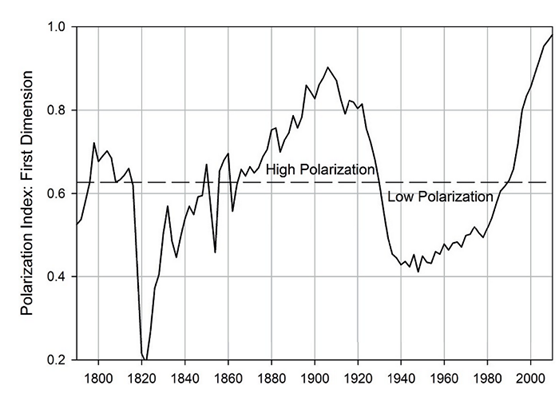As you may have noticed, politics has got a tad heated of late.
But is this because of ‘accidents’, that in slightly different circumstances might easily not have happened; or is our present discord the inevitable consequence of deeper historical trends?

Scott Alexander of State Star Codex has a fascinating book review of Ages of Discord by Peter Turchin, which argues that there are decades-long cycles in American history – i.e. “long spells of equitable prosperity and internal peace [that] are succeeded by protracted periods of inequity, increasing misery, and political instability.”
Turchin presents various datasets to back-up this idea of long cycles – indicators of income equality, social mobility, social optimism and political polarisation.
Broadly, the trends appear to move together in long-term cycles – and as inequality, immobility and pessimism all increase so does political polarisation.
I won’t go into Alexander’s detailed critique of Turchin’s arguments, but will only note that the reviewer believes that the book’s data “seem basically accurate” (which doesn’t mean that he’s convinced by the book’s conclusions).
If the specific statistics chosen really are indicative of broader historical trends then one thing is for sure: we (or at least the Americans) are on the wrong side of the long-term cycle – i.e. on a slope of increasing social stress and political strife.
The key questions therefore are these: How much worse is it going to get? And, what, if anything, can we do to turn the corner?








Join the discussion
Join like minded readers that support our journalism by becoming a paid subscriber
To join the discussion in the comments, become a paid subscriber.
Join like minded readers that support our journalism, read unlimited articles and enjoy other subscriber-only benefits.
Subscribe